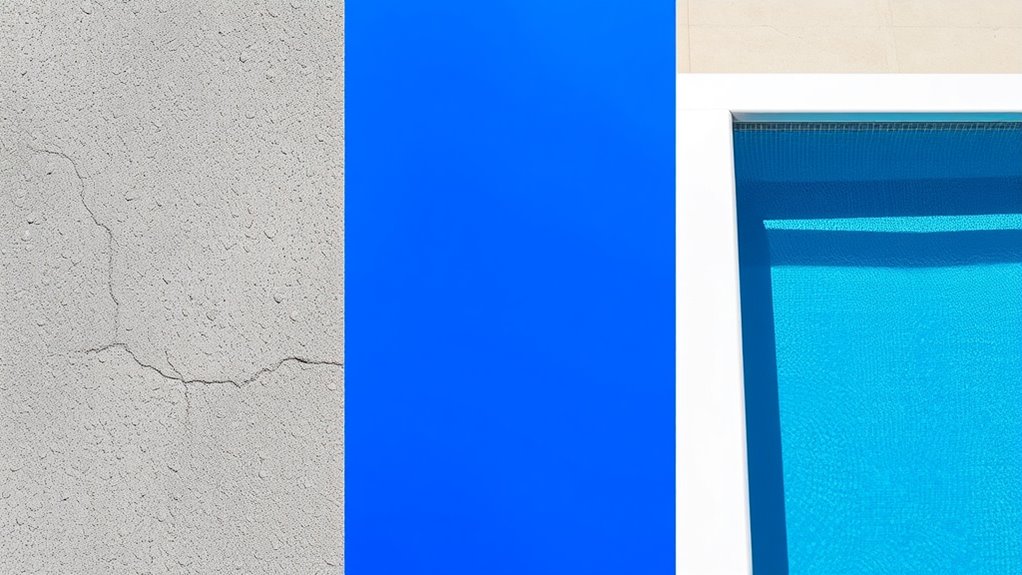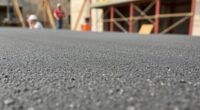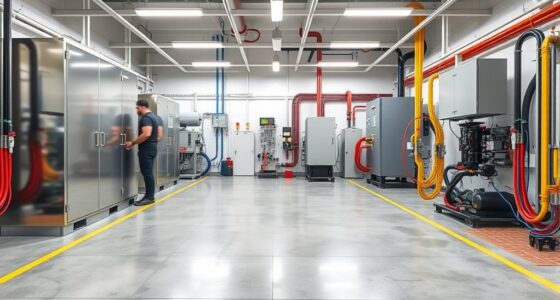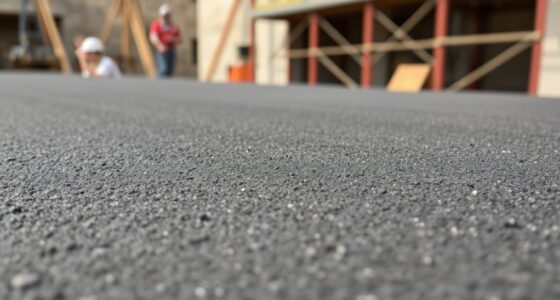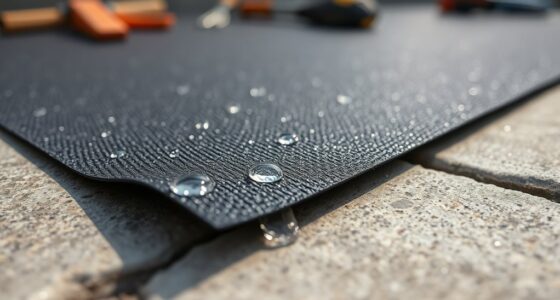When choosing between concrete, fiberglass, and vinyl pools, consider the construction process, costs, and maintenance. Concrete pools are highly customizable, durable, but have higher upfront costs and longer installation times. Fiberglass pools are quick to install, low-maintenance, and resistant to algae, but offer less shape flexibility. Vinyl pools are budget-friendly and quick to set up, but require liner replacements every 5-15 years. Keep exploring to find out which option fits your needs best.
Key Takeaways
- Concrete pools offer maximum design flexibility but have longer installation times and higher initial costs.
- Fiberglass pools are quick to install, low-maintenance, and resistant to algae, but limited in shape options.
- Vinyl pools are the most budget-friendly upfront, with rapid setup, but require liner replacements every 5-15 years.
- Concrete pools are highly durable and customizable but need ongoing maintenance like resurfacing; fiberglass and vinyl have lower upkeep.
- Installation timelines vary: concrete takes weeks/months, fiberglass about a week, and vinyl just a few days.
Material Composition and Construction Process
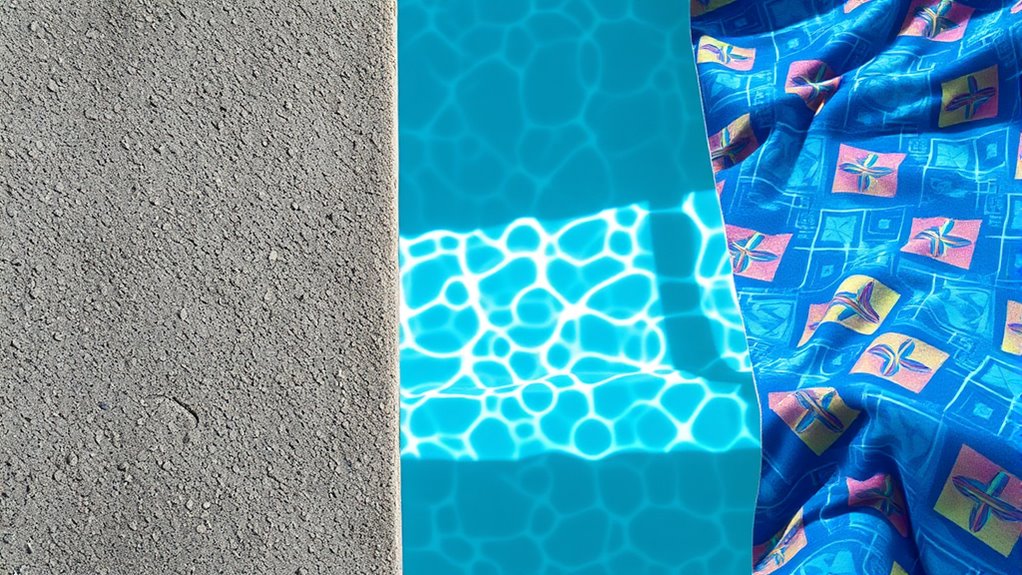
When it comes to pool shells, understanding their material composition and construction process is essential. Concrete pools are built by pouring a steel-reinforced concrete shell, which is shaped on-site with formwork. This process allows for customized designs but takes longer to complete. Fiberglass pools are prefabricated in factories as smooth, gel-coated shells, then transported and installed directly into excavated holes. They’re formed using molds, ensuring a seamless, durable surface. Vinyl pools are created with a flexible vinyl liner stretched over a frame of steel or polymer walls. The liner is installed after the hole is excavated and the frame is assembled. Each method has a distinct construction process, affecting how the pool is built, shaped, and finished. Additionally, the installation timeline for each type varies significantly, impacting planning and project management.
Cost, Durability, and Maintenance Considerations
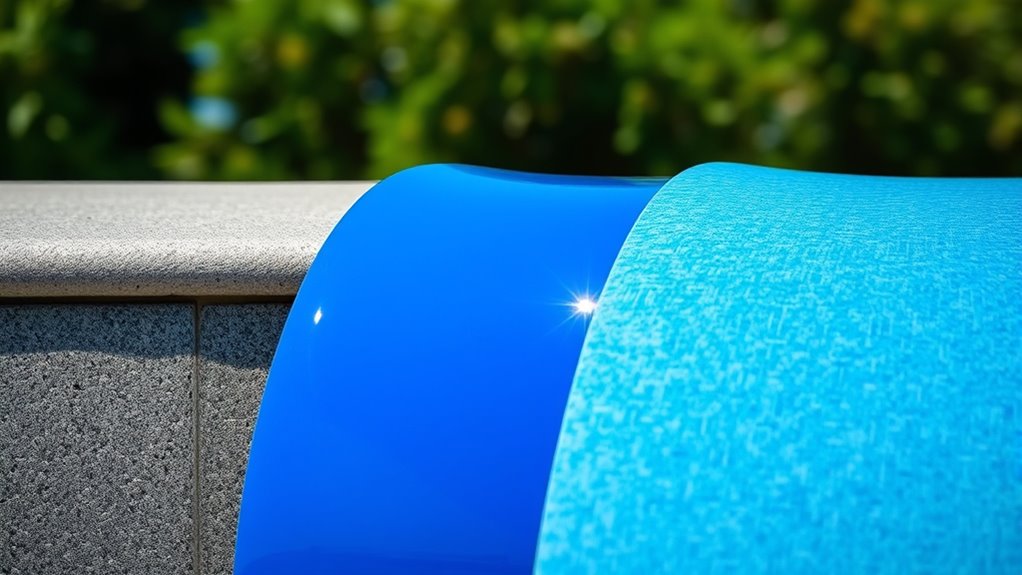
Choosing the right pool shell depends heavily on your budget, long-term durability, and maintenance needs. Concrete pools usually have higher initial costs but excel in durability, often lasting decades with proper care. They require more maintenance, including regular resurfacing and sealing to prevent cracking and staining. Fiberglass shells tend to be more affordable upfront and are low-maintenance, resisting algae and staining naturally. Their smooth surface reduces cleaning time, but repairs can be costly if damage occurs. Vinyl liners are generally the most budget-friendly initially, but they need frequent replacements—every 5 to 15 years—adding to long-term costs. While vinyl pools require less routine maintenance, they may need liner replacements, which can be inconvenient. Your choice hinges on balancing upfront investment with ongoing upkeep and longevity. Additionally, understanding pool surface materials can help inform your decision based on how each type interacts with water chemistry and surface longevity.
Design Flexibility and Installation Time

The type of pool shell you select can considerably impact the design options available and how quickly you can enjoy your new backyard oasis. Concrete pools offer unmatched design flexibility, allowing you to customize shape, size, and features to fit your vision. However, their installation takes longer—often several weeks or months—due to curing times and complex construction. Fiberglass shells come pre-formed, so installation is much faster, often completed within a week. While they limit shape options, they still provide a sleek, streamlined look. Vinyl pools are the quickest to set up, typically installed in a few days, with flexible shapes that can be easily customized during the manufacturing process. Your choice depends on your desired design complexity and how soon you want to immerse yourself. Automation in construction technology is also increasingly being used to streamline pool installation processes and improve efficiency.
Frequently Asked Questions
Which Pool Shell Type Offers the Best Insulation Properties?
You’ll find that concrete shells generally offer the best insulation properties among pool types. Their dense construction retains heat well, helping you save on heating costs and maintain a comfortable water temperature longer. Fiberglass pools have moderate insulation, while vinyl liners provide the least. If insulation is your priority, concrete is your best choice, especially if you plan to use your pool year-round or in cooler climates.
How Do Pool Shell Materials Impact Water Temperature Regulation?
You’re in the driver’s seat when it comes to water temperature regulation, and your pool’s shell material plays a key role. Fiberglass shells are like a cozy blanket, offering excellent insulation and helping keep your water warm longer. Concrete shells tend to lose heat faster due to their thermal conductivity, while vinyl liners are less effective insulators. Choose wisely to keep your pool comfortably warm all season long.
Are There Environmental Concerns Associated With Each Pool Shell Material?
You should consider that concrete pools can have higher environmental impacts due to cement production, which releases significant carbon emissions. Fiberglass shells involve manufacturing processes that may involve harmful chemicals, but they’re often more energy-efficient overall. Vinyl pools typically use PVC, which can raise concerns about plastic waste and chemical leaching. Overall, choosing eco-friendly materials and sustainable practices can help reduce environmental impacts no matter the shell type.
Which Pool Shell Type Is Most Resistant to Algae Growth?
You’ll love this—fiberglass shells are the superheroes here, resisting algae like a pro. Their smooth, non-porous surface keeps algae at bay because it’s tough for bacteria to cling. Concrete and vinyl? Well, they’re more like the party hosts that forget to clean—more algae-friendly. So, if you hate scrubbing and love a low-maintenance pool, fiberglass is your best bet for algae resistance.
How Does Each Material Affect Long-Term Resale Value?
You’ll find that a concrete pool often boosts your resale value due to its durability and customizable design, appealing to buyers seeking a luxurious look. Fiberglass pools tend to have a moderate impact, as their low maintenance appeals to practical buyers. Vinyl pools may slightly lower resale value since they’re less durable and can require replacements, but if well-maintained, they still attract cost-conscious buyers.
Conclusion
Choosing the right pool shell depends on your priorities—whether it’s the unbeatable durability of concrete, the low maintenance of fiberglass, or the affordability of vinyl. Each material has its merits, but remember, your pool is the centerpiece of your backyard oasis. Make an informed decision, and you’ll have a backyard paradise that outshines even the most breathtaking resorts. Ultimately, your choice shapes your summer memories—so pick wisely and leap into a pool that’s truly built to last!
